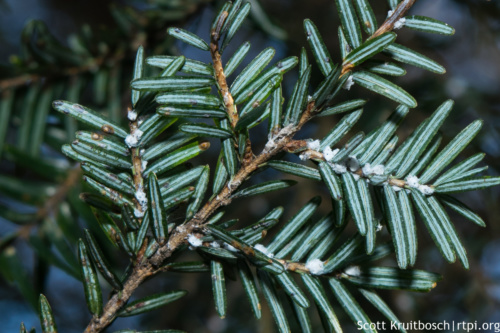Although autumn is just beginning in Western New York and Pennsylvania, the winter season will soon be upon us. The colder months, November through March to be exact, are the best time of year to search the area’s forests for an invasive forest pest known as Hemlock Woolly Adelgid (HWA). HWA is an aphid-like insect, originating from Asia, which feeds off of the food storage cells below the needles of an Eastern Hemlock tree and hides itself under white woolly masses for protection. Within only a matter of 4-10 years an individual tree can succumb to an HWA infestation if left unnoticed. This deadly bug has been progressively moving closer to the area as it has spread throughout much of the eastern United States, leaving massive stands of hemlocks dead in their wake. Early detection of this particular pest is crucial as the spread of HWA can be managed. Collaborating organizations joined by a multitude of dedicated community members are working together to educate the public about HWA and to slow its spread throughout the region.
Throughout the winter months, citizens interested in monitoring Eastern Hemlocks for the presence or absence of Hemlock woolly adelgid infestations can get involved by joining the High Allegheny Hemlock Conservation Partnership. This joint project led by the USDA Forest Service (USFS) and Nature Conservancy began several years ago and allowed citizens to adopt sites to monitor on an annual basis. In an effort to expand the project, the Roger Tory Peterson Institute of Natural History (RTPI) has been added as a partner. Together, the three groups are planning to host two training sessions for those that are new to the project as well as for those that have been involved but would like to be updated. Citizens will have the opportunity to learn more about the history of the project, the significance of Eastern Hemlocks in our forests, the biology of HWA, how to report sightings, and even adopt a site to monitor this winter. The first training session will take place Monday, November 5th from 6:00-8:00pm at the Allegheny National Forest, Marienville District Office located at 131 Smokey Lane, Marienville, PA. The second training is scheduled for Wednesday, November 14th from 6:00-8:00pm at 162 Swarts Hall on the University of Pittsburgh-Bradford campus located at 300 Campus Drive, Bradford, PA.
Questions about the training sessions can be directed to Elyse Henshaw (RTPI) at ehenshaw@rtpi.org or Andrea Hille (USFS) at ahille@fs.fed.us.













